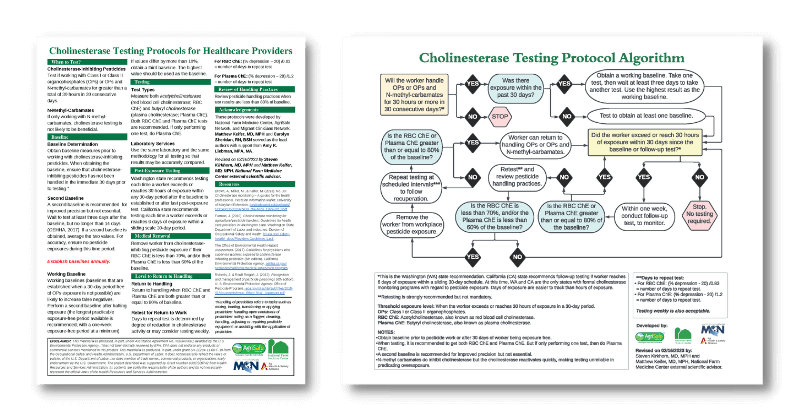In honor of Mother’s Day, we’re proud to announce that our Safe Pregnancy and Birth mobile app is now available for free as a beta release for Android phones. Click here to download it now from the Google Play app store. In January, we released our app for iPhones; click here to download it from the Apple store. If you don’t have an Android or iPhone, you can preview the app here
- http://e2ma.net/go/11032126792/208891732/234042635/35444/goto:https://play.google.com/store/apps/details?id=org.hesperian.safepregnancyandbirth
- http://e2ma.net/go/11032126792/208891732/234042636/35444/goto:http://itunes.apple.com/us/app/safe-pregnancy-and-birth/id496919735?mt=8
- http://e2ma.net/go/11032126792/208891732/234042637/35444/goto:http://hesperian.org/books-and-resources/safe-pregnancy-and-birth-mobile-app/

These Cholinesterase (ChE) clinical tools provide a concise and simple format to guide clinicians in monitoring the ChE levels for patients working with Class I and Class II organophosphates (OP) or OP and N-methyl-carbamates.
An Action Plan for Implementing a Primary Care Clinician’s Evidence-Based Toolbox and Guide.
- CRC Action Plan brochur PAGE 1-11_0.pdf (621.73 KB)
One page document designed to educate clinicians about important elements of colorectal cancer screening using fecal occult blood tests (FOBT). Provides state-of-the-science information about guaiac and immunochemical FOBT, test performance and characteristics of high quality screening programs.
- FOBT Clinician's Reference Final 2012_0.pdf (298.33 KB)
This is a comprehensive, practical toolkit for primary care sites to implement more effective colon screening practices. Even though highly effective methods of CRC screening are available across the country, the current rates of screening, and of complete diagnostic examination that should flow from screening, remain inadequate. Thus, the potential benefits of widespread CRC are unrealized. The American Cancer Society has established the goal of 75 percent of the eligible population screened for CRC by the year 2015. This guide will help us reach that goal.
- acspc-024588sm.pdf (1.95 MB)
This booklet is intended to help Community Health Centers put in place an effective and efficient workers' compensation program.
- MedicalServicestoWorkers-2012.03.27.pdf (5.57 MB)
To provide guidelines for a thorough and consistent management of immunizations to our Clients throughout the Waimanalo Health Center.
- 2004+immunization+protocol.doc (35 KB)
- WomHlthIssu2009_0.pdf (253.37 KB)
- TrendsBH in CHC_0.pdf (84.01 KB)
- PsychServ07ps1533.pdf (481.79 KB)
- Mental Illness in Hispanics.pdf (1.46 MB)
- 20120113171059102.pdf (317.05 KB)
Hidden Harvest is a nonprofit organization that gleans or rescues produce from Coachella Valley fields and packing houses. After harvest is complete, local farmers leave millions of dollars worth of first-rate produce behind in the fields due to market fluctuations and other factors.
Hidden Harvest takes advantage of this bounty and delivers the healthy produce free-of-charge to agencies that serve the hungry and needy
Hidden Harvest's mission is twofold - 1) to hire low income farmworkers at $10 per hour (above prevailing wage) to 2) to"rescue" or glean fresh, healthy and locally grown food from farmers' fields and area packing houses to feed the poor and hungry.
The National Institutes of Health (NIH) Undergraduate Scholarship Program (UGSP) offers competitive scholarships to students from disadvantaged backgrounds who are committed to careers in biomedical, behavioral, and social science health-related research. The program offers:
- Scholarship support
- Paid research training at the NIH during the summer
- Paid employment and training at the NIH after graduation
SCHOLARSHIP REQUIREMENTS
The NIH Undergraduate Scholarships are awarded on a competitive basis to students who show a commitment to pursuing careers in biomedical, behavioral, and social science health-related research. The following are the basic requirements:
- U.S. citizen, national, or qualified non-citizen.
- Enrolled or accepted for enrollment as a full-time student for the 2012-2013 academic year at an accredited, 4-year undergraduate institution.
- High school seniors are not eligible to apply.
- 3.5 GPA or higher (on a 4.0 scale) or within the top 5 percent of your class.
- From a disadvantaged background. Disadvantaged background means that your financial aid office has certified you as having "exceptional financial need." (Federal Register, Vol. 76, No. 51)
Scholarship Support
The NIH UGSP will pay up to $20,000 per academic year in tuition, educational expenses, and reasonable living expenses to scholarship recipients. Scholarships are awarded for 1 year, and can be renewed up to 4 years.
A depression diagnosis that warrants treatment or treatment change, needs at least one of the first two questions endorse as positive (little pleasure, feeling depressed) indicating the symptom has been present more than half the time in the past two weeks.
In addition the tenth question about difficulty at work or home or getting along with others should be answered at least "somewhat difficult".
When a depression diagnosis has been made patient preferences should be considered, especially when choosing between treatment recommendations of antidepressant treatment and psychotherapy.
A depression diagnosis that warrants treatment or treatment change, needs at least one of the first two questions endorse as positive (little pleasure, feeling depressed) indicating the symptom has been present more than half the time in the past two weeks.
In addition the tenth question about difficulty at work or home or getting along with others should be answered at least "somewhat difficult".
When a depression diagnosis has been made patient preferences should be considered, especially when choosing between treatment recommendations of antidepressant treatment and psychotherapy.
The PHQ-2 inquires about the frequency of depressed mood and anhedonia over the past two weeks. The PHQ-2 includes the first two items of the PHQ-9.
The purose of the PHQ-2 is not to establish a final diagnosis or to monitor depression severity, but rather to screen for depression in a "first step" approach.
Patients who screen positive should be further evaluated with the PHQ-9 to determine whether they meet criteria for a depressive disorder.